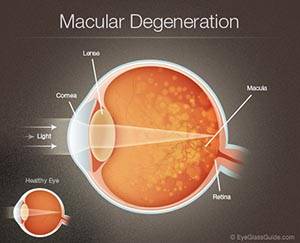 As a disease usually associated with aging, macular degeneration is also called age-related macular degeneration (ARMD), though there are other, less common types of macular degeneration.
As a disease usually associated with aging, macular degeneration is also called age-related macular degeneration (ARMD), though there are other, less common types of macular degeneration. Macular degeneration symptoms include a gradual loss of central vision needed to perform everyday tasks like driving or reading, and a reduced ability to see small visual details like fine print or patterns.
Age-related macular degeneration is the leading cause of vision loss in Americans over age 60, and presents itself in two forms: dry macular degeneration and wet macular degeneration. Of the two, the “dry” form is far more common. Both affect the center region of the retina, the light-sensitive area in the back of the eye responsible for processing images we see.
Macular Degeneration Statistics
Currently, macular degeneration is the leading cause of vision loss in persons over age 60. Caucasians are far more likely to lose vision from ARMD than African Americans, and studies show that obesity, smoking, and exposure to UV rays may also be risk factors for developing the disease.
Macular degeneration tends to affect women more than men, and has also been linked to heredity. Nearly 90% of all diagnosed ARMD is the dry form.
Special thanks to the EyeGlass Guide, for informational material that aided in the creation of this website. Visit the EyeGlass Guide today!


